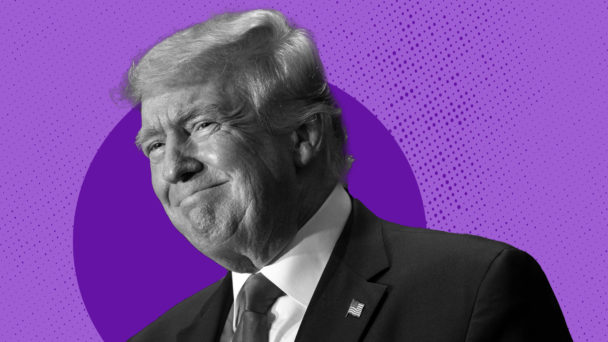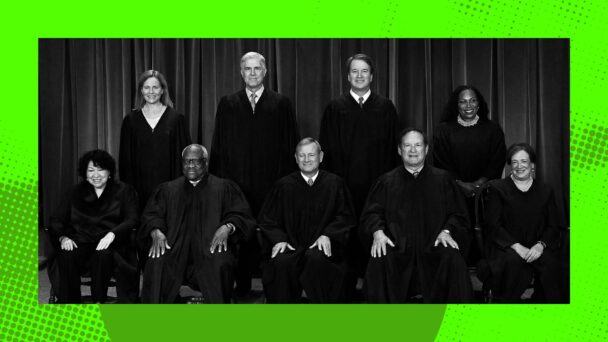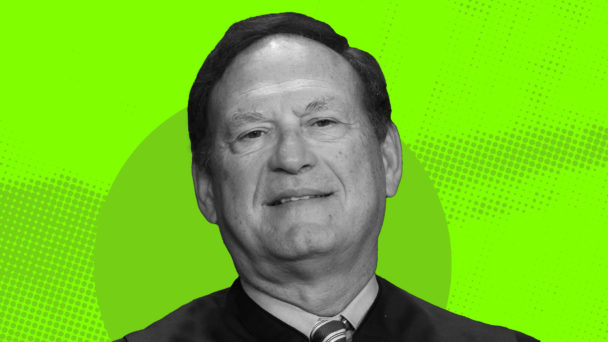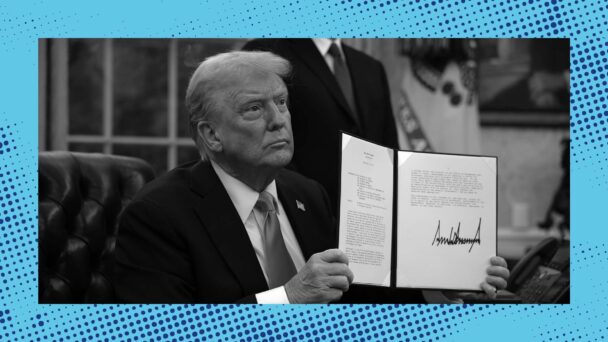Last August, Federalist Society co-founder Steven Calabresi offered his blunt answer to the question of whether the Constitution allows Donald Trump to serve as president a second time. In his debut post at the Volokh Conspiracy, an influential blog published by a collective of right-leaning law professors, Calabresi called January 6 an “insurrection” and blasted Trump as an oathbreaking insurrectionist who “lied to the American people for years that the election had been stolen and continues to repeat those lies even to the present day.” If a case about Trump’s eligibility were to come before the Supreme Court, Calabresi urged the justices to “open the dictionary and tell us what we all already know—that Trump incited an insurrection and is disqualified from being on any primary or general election ballots.”
Calabresi quickly understood that he’d made a terrible mistake, because in the months since, he has been diligently blogging his efforts to walk this conclusion back. In September, he wrote that he had “changed his mind” about the matter of Trump’s eligibility for the White House—a position he reiterated in a letter to the The Wall Street Journal, where he knew his target audience would take notice. At the same time, Calabresi was careful to note that this was only his legal opinion, and that as a “Never Trumper,” he would, “if necessary,” vote for President Joe Biden in the general election. “I strongly urge my fellow Americans to vote against Trump, almost no matter what else is the alternative,” he said.
But then, in a landmark ruling in December, the Colorado Supreme Court determined that Trump—by that time the presumptive Republican nominee—was constitutionally disqualified from holding office and could not appear on the primary ballot. Suddenly, the question Calabresi had spent several months wrestling with was no longer academic, and in a remarkable coincidence, around this same time, Calabresi fully reversed himself: Presidents, he wrote, are “obviously” not covered by the Disqualification Clause, and January 6, although “very, very bad” was not an “insurrection or rebellion.” Calabresi clarified that he still would not vote for Trump “under any circumstances,” but argued that the “wrong” of January 6 “should not be used to perpetrate the additional wrong of keeping Trump off the ballot.”
Things have continued like this ever since. Over the past six months, Calabresi’s writing at the Volokh Conspiracy has grown increasingly sympathetic to, if not Trump personally, then to the success of Trump’s presidential bid as a necessary condition for the conservative movement’s political success. This culminated in a late-night post on Friday in which Calabresi finally went full voter fraud truther, asserting that widespread use of mail-in voting in 2020 produced a “fundamentally illegitimate Biden victory,” and that the election was “probably stolen”—the same claim he’d excoriated as a “lie” less than a year earlier. Calabresi further explained that he “disapproved” of Trump’s behavior on January 6 not because Trump was wrong, but because Trump failed to persuade the rioters who called for Vice President Mike Pence’s summary execution to follow in the footsteps of “a Martin Luther King or a Mahatma Gandhi.”
Calabresi would hardly be the first older Republican white guy to get lost in the darker corners of the conservative media ecosystem. But his warp-speed transformation from venerated legal scholar to Breitbart comment section moderator is notable because of its implications for the viability of the conservative legal movement, whose adherents have long insisted that their movement is defined by loyalty to the Constitution, not to partisan politics. What Calabresi learned the hard way is that, to the extent that FedSoc types ever took those principles seriously, it is impossible to do so anymore: If you are a conservative in 2024, you can be a critic of Donald Trump, or you can be relevant, but you cannot be both. Calabresi saw the winds shifting, and trimmed his sails accordingly.
This is not Calabresi’s first philosophical about-face. In an interview with Professor Steven Teles, author of Rise of the Conservative Legal Movement, Calabresi explained that when he helped found the Federalist Society at Yale Law School in the early 1980s, the organization’s early strategy was informed by some of its co-founders’ own political conversions. “I was persuaded by Reagan that conservative ideas were right, but I was definitively a liberal who became a conservative,” Calabresi said. “We tended to assume that if we could make the transition, other people could also.”
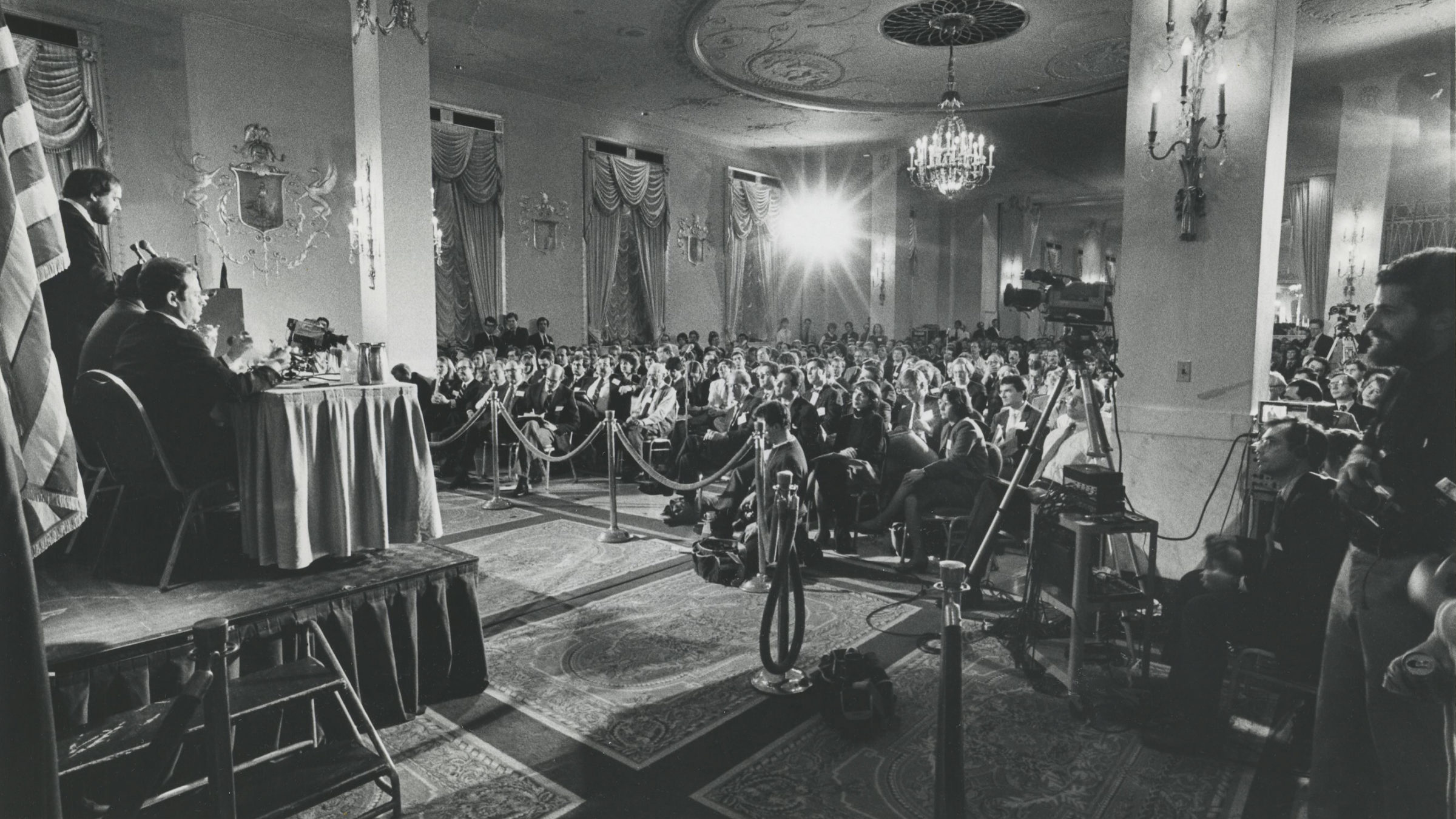
The Federalist Society’s first-ever annual lawyers convention at the Mayflower Hotel in Washington, D.C., January 1987 (Ray Lustig/The Washington Post via Getty Images)
In the ensuing years, the Federalist Society evolved from a social club for lonely conservative law students to the engine of the conservative legal movement, whose leaders have served as the first and last word on judicial nominations for multiple generations of Republican presidents. As a result, Calabresi enjoys the sort of niche celebrity status typically afforded to retired NBA players who are invited to sit courtside for their old team’s home playoff games: After stints in the Reagan and George H.W. Bush administrations, Calabresi took a position at Northwestern University School of Law, where he’s taught ever since. He remains a co-chair of the Federalist Society’s Board of Directors, allowing him to share in the triumphs of the conservative counterrevolution he sought to mainstream four decades earlier.
Like most conservative legal elites, Calabresi has spent most of his career maintaining at least the illusion of separation between his legal work and his partisan preferences. In 2016, for example, he co-authored a law review article in which he concluded that, under an originalist analysis, state laws banning same-sex marriage violate the Fourteenth Amendment. In 2022, he expressed his “strong support” for affirmative action, and said—I swear this is real—that he favors “reparations for slavery and for Jim Crow.” That same year, he co-wrote an amicus brief criticizing the independent state legislature theory, which posits that (Republican-controlled) state legislatures enjoy near-total power to administer elections as they see fit. The Court rejected the theory in 2023, but Calabresi’s stunt prompted the Board of Directors to forbid him from identifying himself as a co-founder of the Federalist Society, because in certain circles of the legal profession, people who defend the concept of representative democracy are just too embarrassing to be associated with.
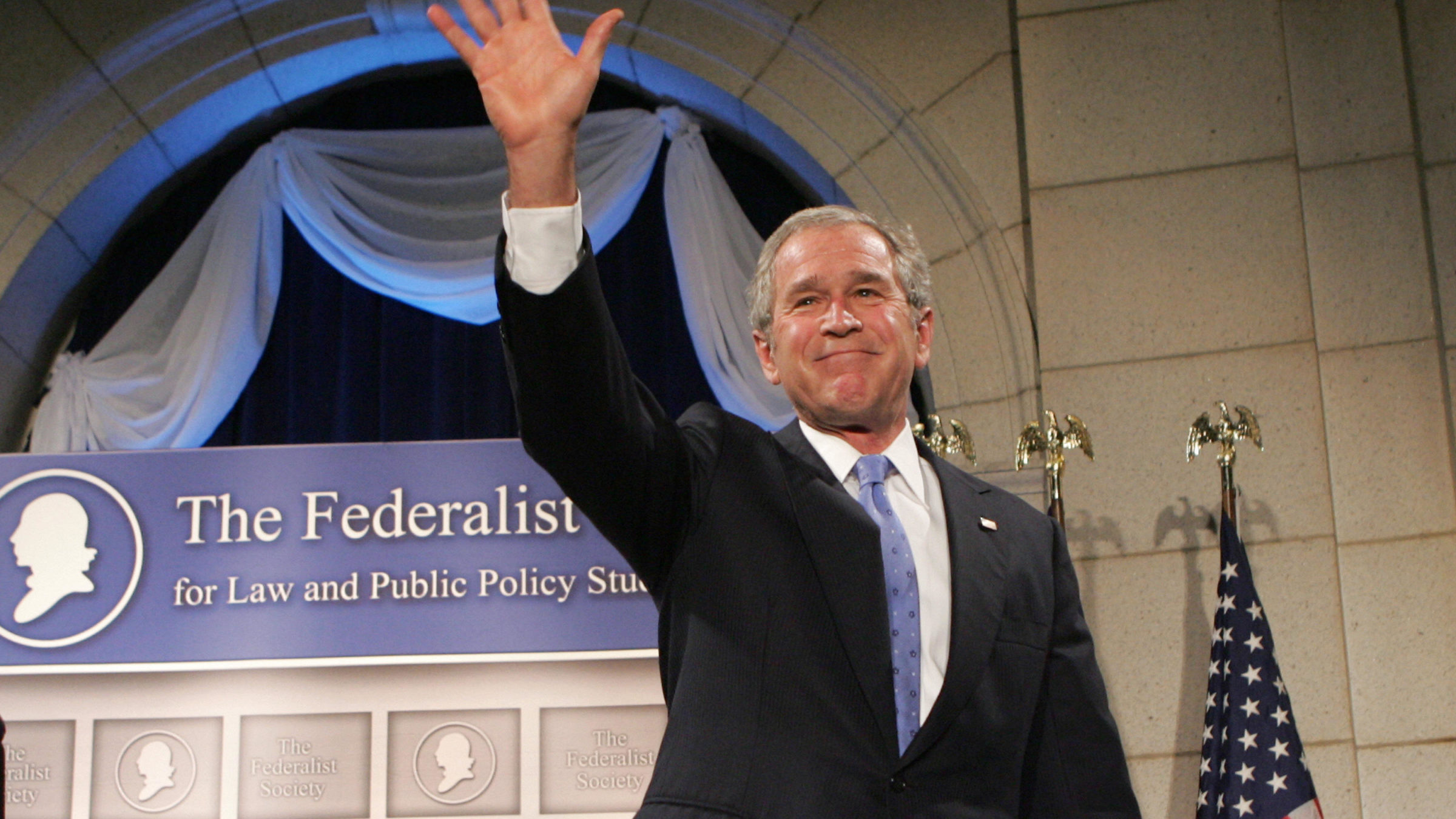
President George W. Bush delivers a speech a Federalist Society event, 2007 (SAUL LOEB/AFP via Getty Images)
During the Trump administration, this willingness to depart from conservative orthodoxy put Calabresi among the president’s more vociferous critics on the right. In July 2020, when Trump suggested postponing the presidential election to prevent the “most INACCURATE & FRAUDULENT Election in history,” Calabresi wrote in the New York Times that the president’s “fascistic” message was, by itself, grounds for impeachment and conviction. After January 6, Calabresi again took to the pages of the Times, this time with a former Obama administration official, to call on Congress to act. “He is a danger to the nation and must be removed immediately and disqualified from ever holding public office,” Calabresi wrote.
Over the past three years, however, Calabresi has gradually found himself—perhaps for the first time since his Yale Law School days—relegated to the margins of power and influence. This time, he is losing not to liberal twentysomethings who think trickle-down economics is tedious horseshit, but to an ascendant far-right wing of the Republican Party that regards conservative establishment luminaries like him as spineless RINOs who were too cowardly to help Trump finish his coup the right way. In November 2023, the New York Times reported that within Trump’s inner circle, even the “Federalist Society” label had become a “slur” of sorts—“a shorthand for a kind of lawyerly weakness.”
In yet another wild coincidence, this is around the time that Calabresi’s writing shifted from stodgy analyses of the Reconstruction Amendments to randomly-capitalized culture-war rants. On three consecutive days in December, he attacked the appointment of special counsel Jack Smith as unconstitutional, and deemed Smith’s January 6 prosecution of Trump to be “null and void.” He defended Clarence Thomas, whom he described as “the best and most incorruptible Supreme Court Justice in U.S. history.” He lauded Judge Aileen Cannon, a Trump appointee who has been criticized for slow-walking the classified documents criminal case against her benefactor, as a “heroine” who deserves “a national round of applause.”
One thing I learned today is that FedSoc co-founder Steven Calabresi writes like a high school junior who forgot when the book report was due https://t.co/sMxQHHF2RT pic.twitter.com/qHiKdqNji5
— Jay Willis (@jaywillis) December 23, 2023
Yet nothing has incensed Calabresi quite like Trump’s legal troubles in New York: a civil fraud case that ended with a judge ordering Trump to pay $355 million, and a criminal case that ended with a jury of Trump’s peers convicting him on 34 felony counts. The fraud case, in Calabresi’s view, is a “Stalinist nightmare” that the U.S. Supreme Court “MUST” reverse; the criminal case is a “mockery of a trial” perpetrated by “lying liberal district attorneys” and “lying liberal jurors” who are conspiring to give Trump the “Michael Flynn treatment.”
Borrowing some of the former president’s favorite catchphrases, Calabresi called both cases “political witch hunts” brought by “Democrats suffering from Trump derangement syndrome.” After the verdict in the criminal case, he again beseeched the Supreme Court to step in and save Trump from such an egregious miscarriage of justice.
As of this writing, Calabresi’s latest post is an outraged defense of—what else?—Justice Samuel Alito’s fondness for flying coup-adjacent flags. Calabresi’s take quickly devolves from a boring recap of the justice’s defenses to a full-on screed condemning “the Left” for its multitudinous attempts, Alito-related and otherwise, to “take a wrecking ball to all of our constitutional rights and freedoms.” Calabresi concludes with what reads like bad parody of Baseball Crank prose: “Thank God that we have men and women on the Supreme Court who are willing to stand up for the Constitution notwithstanding the hell that the Left has made of their lives,” he says. “This is how constitutional democracies die, my friends.”
I’m asking sincerely, is Steve Calabresi okay? https://t.co/q0nlpTsj4W pic.twitter.com/xRCj0jmSrw
— Jay Willis (@jaywillis) March 9, 2024
Calabresi’s embrace of voter fraud post conspiracy theories was enough to prompt at least one high-profile member of the law professor blogosphere, Rick Hasen, to express public concern for Calabresi’s mental health. The following afternoon, Calabresi wrote that he “misspoke” by characterizing the election results as “fraudulent,” which is, as far as I can tell, the first time anyone (at Volokh or otherwise) managed to convince him that he’d wandered a little too far into tinfoil-hat territory before hitting PUBLISH. (The Volokh Conspiracy is published by the libertarian magazine Reason, but is editorially independent from Reason, whose staffers have no control over content—or copy-editing—at the Volokh Conspiracy.)
But even if Calabresi is, as Hasen suggests, perhaps going through some things right now, none of his rhetoric puts him outside the Republican Party mainstream. Questioning the results of the 2020 election is table stakes for any Republican who aspires to hold public office. Half the House Republican caucus voted to challenge the 2020 election results, including now-Speaker Mike Johnson. In 2022, 370 Republican candidates had at least some history of election denialism, and with Trump back on the ballot in 2024, I would not expect that number to be lower this time around. Prominent Republicans, including several potential Trump running mates, have refused to say whether they’ll accept the results if Trump doesn’t win, because they understand that toeing the MAGA line is their only viable career option.
For a long time, establishment Republicans have drawn a distinction between the conservative legal movement, which is ostensibly composed of serious people, and the Make America Great Again faction, which the serious people tolerate in the name of political expedience. From the beginning of Trump’s rise to power, they treated him as an aberration that their movement, committed to the rule of law as it was, would surely outlast—someone whom they could use while it was convenient, and dispose of when it was not. And by making peace with Trump during his first term, the Federalist Society was indeed able to overhaul the Supreme Court, installing three life-tenured justices whose votes at last formed a majority necessary to overturn Roe v. Wade. As a law student, Calabresi dreamed about his ideas being taken seriously; he probably never imagined winning this much, this fast.
What Calabresi failed to understand is that he and his colleagues had the power dynamic exactly backwards: While the conservative legal movement imagined itself to be using Trump as a means to an end, the modern Republican Party was quietly swallowing the conservative legal movement whole. As a result, one of its most distinguished alums has been reduced to cranking out desperate late-night blog posts condemning the proverbial radical left, hoping that someone in a position of power will notice, forgive him for his heresies, and welcome him back into the fold. I would not bet on it.

